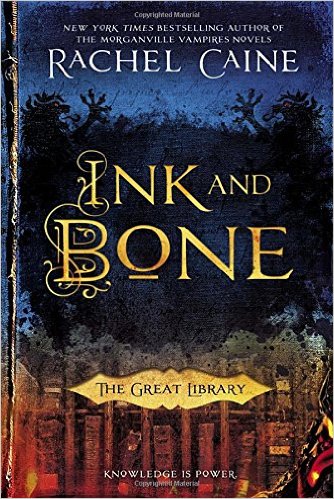 The sequel to Ink and Bone titled, Paper and Fire, comes out this week, so I thought a review might be timely.
The sequel to Ink and Bone titled, Paper and Fire, comes out this week, so I thought a review might be timely.
Some have likened Ink and Bone to Harry Potter meets the Book Thief and even Hunger Games. I see the similarities, but I’m not quite there. I think Ink and Bone stands as a fresh approach, but lacking Rowling’s whimsy and magic or Zusak’s narrative voice, or Collins’ terse strength. I haven’t finished reading the Book Thief yet, so I may revise these comments later. I read some reviews of Ink and Bone that didn’t care for the opening, but I thought it dropped me into Rachel Caine’s novel in a compelling way and led me straight to the pivotal scene with the ink licker.
Usually, I quibble with a book about books, but this one worked well. It is a ‘what if’ fantasy that asks what if the Library of Alexandria never burned. What if the knowledge contained in the library served as the world’s currency and ownership of books containing that knowledge was forbidden? The world’s law and government are ordered through the Library and the Library watches and records every person’s life through electronic journals. Those who choose to abandon their journals and fight against the control of the library are branded heretics and burners often electing to set themselves and their journals on fire in a bid for the ultimate freedom of death.
The main character, Jess Brightwell, is the son of a book smuggler. Due to his father’s business, Jess has held and read many rare books and has an uncanny sense about them. Rather than follow in the family trade, Jess successfully tests and receives a berth at the Library’s training facility in Alexandria. Enter the school setting and the similarities with Harry Potter and a thousand other fantasies. This school tests many skills while imagining Alexandria in 2025 as the seat of global power with its library still intact and the people of the Library: Scholars, Guarda and Obscurists as legislators, law enforcement, imprisoned magical minorities who preserve absolute dominion of the Library.
I agree with one reviewer who noted that the story breaks down when we learn that all people have access to all books through their electronic journal. I did wonder what difference it would make if all written work was available electronically to all mankind. Only a single study was banned and removed from access; that being the repeated invention of the printing press. I liked the idea, but a more in depth look, something beyond the nature of light YA science-fiction fantasy, would probably ruin the story making it too cumbersome.
This brings me to my final pint (oh oops, perish the thought of a final pint) point. Rachel Caine does go the extra mile, so to speak in studying the effects of the printing press through the historical notes at the beginning of the chapter. These are rightly called Ephemera from the Greek meaning not intended to last the day, something not meant to be retained or preserved and definitely not preserved in the codex. In these we learn backstory and history and family connections. We read coded messages and learn the history of the resolute printing press, and its connection to major characters in the book, we also read of the corruptive nature of power in the twisted logic of the Library’s elite. Because of the Ephemera, I consider the book a bigger work and would re-read it. These notes in the front of the chapters cause me to think of politics over lives, worldly treasures over love, and re-writing history over truth. It’s a keeper. Thank you for reading and thank you, Rachel Caine, for writing.
Also posted on Goodreads, justonebeggar.net and writingroguesrant.blogspot.com

 I am a mother, author, engineer, farmer, occasional actress, and incurable dog-sap. I think things and write things and embarrass myself often.
I am a mother, author, engineer, farmer, occasional actress, and incurable dog-sap. I think things and write things and embarrass myself often.